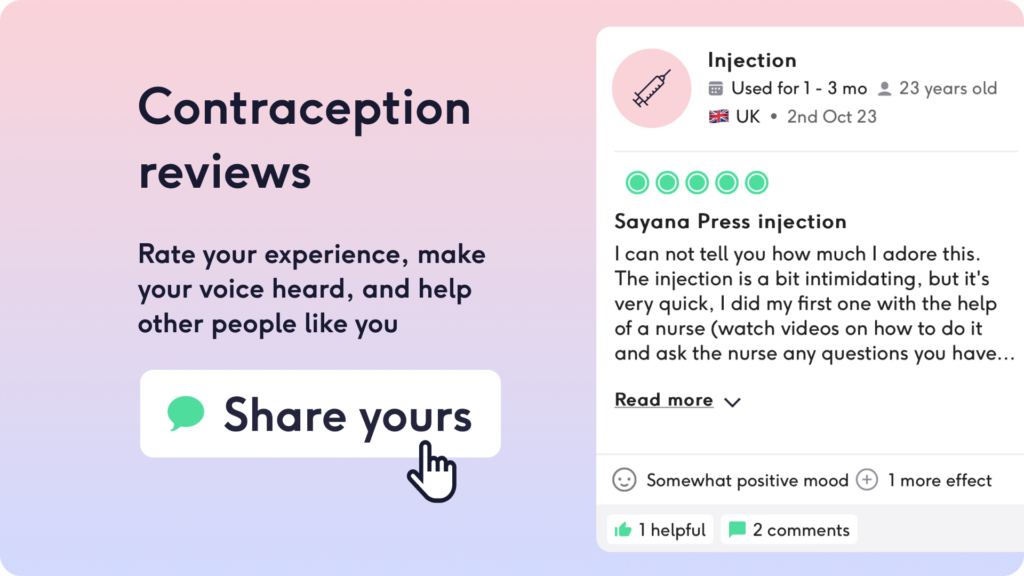Can you get pregnant from precum and what are the chances?
In this article
What's the lowdown?
Pre-cum technically should not contain any sperm, however, research has shown there can be cases where active sperm is found
Due to this, you can technically get pregnant with pre-cum
This is why the withdrawal method is not recommended as a contraception method
If you want to prevent pregnancy and prefer not to use hormones, a barrier method like condoms or the diaphragm is recommended
What is pre-cum?
Now, pre-cum, or pre-ejaculation, is fluid that is discharged from a penis when it is aroused and usually occurs prior to ejaculation. The fluid is released by the accessory sex glands and acts as a natural lubrication during sex. It is different from ejaculation fluid.
Can you get pregnant from pre-cum?
To quickly answer the question you’ve all been waiting for – can pre-cum cause pregnancy? – the chances are very slim (touch wood, pun not intended) but not zero. But if you don’t want to get pregnant – it’s not worth taking the risk.
Pre-cum does not only occur in the moments just before orgasm. Some males might produce more pre-cum than others and at different times during arousal.
Does pre-cum have sperm in it?
Many people also believe – and are told – that pre-cum does not contain any sperm. They are technically right but, before you get too excited, sperm has the potential to leak into pre-cum before it makes its way into the vagina, the cheeky bugger. If ejaculated recently, semen can linger in the urethra and mix with pre-cum while on its way out. Some research has shown that motile sperm can survive for around 4.5 hours in the urethra and if urination occurs at any point, the sperm should be flushed out.
In a 2016 study conducted from the National Library of Medicine, 17% of pre-cum samples had active sperm present. Then in another study published in 2011, motbile sperm was found in 37% of pre-cum samples given by 27 men.
Can I get pregnant even if I’m not ovulating?
Again, yes. Although pregnancy is most likely to occur during ovulation (which you can learn to track yourself using cycle apps), sperm can live inside your body for as long as five days. If it’s in the reproductive tract when an egg is released, the sperm can still fertilise it.
What is the pull-out or withdrawal method?
Doctors in the UK advise against the withdrawal method as a method of contraception on its own. The idea behind this method relies on the penis being all the way out of the vagina before ejaculation and ejaculation occurring away from the vagina or vulva. But this doesn’t take into account issues arouns pre-cum. Some sources advise men pass urine before having sex to help flush out any leftover semen, but there is not evidence to support this practice.
So can you get pregnant from the pull out method?
According to the World Health Organisation in 2019, 47 million women worldwide opt to use the withdrawal method (1). Figures from the USA suggest that with perfect use, 4% of women will have an unintended pregnancy at 1 year; with typical use, this increases up to 22%. (2) This means more than 1 in 5 women using the withdrawal method would fall pregnant.
Most other forms of long-acting contraception have failure rates of less than 1%, and with typical use, the combined and mini pills are around 91% effective (9 in 100 women will get pregnant over 1 year of use).
As the FSRH states, if practised correctly withdrawal may work for some couples, particularly as a backup to other methods of contraception.
What are the chances of getting pregnant from pre-cum?
Let’s break it down into different times of your cycle!
During the fertile window: You are fertile for around 10 days of cycle. Usually ovulation occurs 14 days after the start of your period, and as sperm can survive in the womb for 5 days, so if there is sperm present in the pre-cum there are 5 days on either side of the egg being released for potential fertilisation.
During menstruation: Your period does not protect you against pregnancy. As we said above, the sperm can live for 5 days inside the body so if pre-cum containing sperm is released overlapping with ovulation, there could be a chance of conception.
Ultimately, using the pull-out method is for you to decide, but here are some pros and cons to help you make the decision.
Pros of the pull-out method:
- It’s free
- It does not contain any hormones. (Some women prefer using contraception that does not contain hormones as they could have a negative impact on their body – of course, some females find that hormonal contraception is actually better for them)
- The withdrawal method has no side effects
- By pulling out, other forms of birth control you may be using will be even more effective
Cons of the pull-out method:
- It does not protect you from STIs (sexually transmitted diseases)
- It relies on the male being able to accurately identify when to withdraw and acting on this. Many couples plan to pull out, but sometimes can forget in the heat of the moment
- It’s not as effective as other available methods of contraception
- It is not recommended by doctors as a method of contraception on its own (ie may be used in addition to another recommended method)
Should you take the morning after pill because of precum?
Well, if you are worried about pregnancy, no one can stop you from making the right decision for yourself and choosing to take emergency contraception. As we cannot 100% guaratee pre-cum does not prevent pregnancy, it is a valid worry to have. However, we do not recommend using emergency contraception as a form of contraception itself.
There are multiple types of emergency contraception. Two main hormones are used for the morning-after pill: either ulipristal acetate (sold as ellaOne) and levonorgestrel (which is sold as Ezinelle, Levonelle One Step or LoviOne).
If you’ve considered or are considering using the pull-out – or withdrawal method – as a form of contraception, then you might also want to think about the possibility of pregnancy with pre-cum.
What did The Lowdown reviewers have to say?
“I have three planned children and have used the pull-out method since the birth of my first child 16 years ago. I get pregnant very easily, with each child of mine being conceived when my partner and I decided we wanted to try. It works well for us. But I do want to say that it’s really up to how good the man is in pulling out and timing. This may not be for everyone because of that.”
“It’s not the best”
“The withdrawal method is great because it’s skin to skin and no hormones. But there’s always a higher change you might get pregnant with this method of contraception.”
“Used this method of contraception prior to using the Natural Cycles app to plan a pregnancy. It was highly effective and [a] chosen method of contraception due to worries about side effects of combined pill. Sex drive increased dramatically, and mood became much more stable. Have returned to this method since having first child.”
“Although it is frowned upon, it allows for an enjoyable experience in and out of the vagina. If you are sensible and your partner knows when he will cum and how to control himself, then it is a feasible method. We don’t use this method all the time though.”
“I have been with my partner for over eight years… so we use the pull out method and have never had any pregnancy scares. We used to occasionally use condoms in the beginning but we had two instances of the condom breaking so don’t use them anymore.”
If you are thinking of using the withdrawal method as a form of contraception, then do talk to your nurse , doctor or sexual health specialist. We advise that before starting, switching or stopping any form of contraception, consider speaking with a healthcare professional. The Lowdown offers chats with a professional through the website.
Our medical review process
This article has been medically reviewed for factual and up to date information by a Lowdown doctor.


